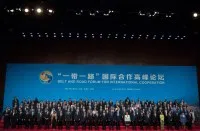This year’s “fire and fury” is directed at Iran
Over the weekend Iran’s President Hassan Rouhani stated,
“America should know that peace with Iran is the mother of all peace, and war with Iran is the mother of all wars”.
Donald Trump responded by Tweeting a short open letter warning the Iranian President about such a confrontation,
“To Iranian President Rouhani: NEVER, EVER THREATEN THE UNITED STATES AGAIN OR YOU WILL SUFFER CONSEQUENCES THE LIKES OF WHICH FEW THROUGHOUT HISTORY HAVE EVER SUFFERED BEFORE. WE ARE NO LONGER A COUNTRY THAT WILL STAND FOR YOUR DEMENTED WORDS OF VIOLENCE & DEATH. BE CAUTIOUS!”
To Iranian President Rouhani: NEVER, EVER THREATEN THE UNITED STATES AGAIN OR YOU WILL SUFFER CONSEQUENCES THE LIKES OF WHICH FEW THROUGHOUT HISTORY HAVE EVER SUFFERED BEFORE. WE ARE NO LONGER A COUNTRY THAT WILL STAND FOR YOUR DEMENTED WORDS OF VIOLENCE & DEATH. BE CAUTIOUS!
— Donald J. Trump (@realDonaldTrump) July 23, 2018
In response to Trump’s Tweet Gholamhossein Gheybparvar, a leading commander in the Iranian Islamic Revolutionary Guard Corps called the US President’s statement “psychological war” and said that the remarks would have no impact on Iran’s resolve to defend itself.
The public exchanges between Iran and the US are highly reminiscent of those from 2017 where Donald Trump and the DPRK’s Supreme Leader Kim Jong-un frequently exchanged threats and provocative warnings with one another. Last year, Trump stated that the DPRK’s warnings to Washington would be “met with fire, fury and frankly power, the likes of which this world has never seen before”.
The remarks exchanged more recently between Hassan Rouhani and Donald Trump follow an incredibly similar pattern. Throughout 2017 when the US and DPRK experienced a period of heightened tensions, officials in Pyongyang including Kim Jong-un threatened that if the US does anything to compromise its security, it would be met with a fierce nuclear response. Now that America’s always tense relations with Iran are entering a new period of hostility due to Trump’s unilateral withdrawal from the JCPOA (Iran nuclear deal), Iran has been issuing increasingly assertive statements including a threat to bloc all oil shipments from the Persian Gulf when the US re-imposes pre-JCPOA sanctions in November.
While the pattern of US sanctions and further threats which is then met by further regional and military threats from the nation targeted by the US is almost identical in respect of the US and Iran this year and the US and DPRK last year, the vexing question is whether the situation with Iran will result in the historic de-escalation that transpired between the US and DPRK when Kim Jong-un and Donald Trump held the first meeting between a sitting US and DPRK head of state in history?
Conventional wisdom would dictate that Iran is in a far more difficult position vis-a-vis the DPRK for the following reasons.
Geography
The DPRK’s geography has long served as an unspoken insurance policy against US aggression against Pyongyang. Located on the border of nuclear superpowers Russia and China, the US has long known that any new war on the Korean peninsula could inevitably drag both Moscow and Beijing into the conflict just as it did in 1950. Furthermore, as thousands of Americans and their families are stationed in South Korea, there is a high likelihood if not a certainty that a substantial number of Americans would be instantly killed in a new Korean war which is to say nothing of the millions of South Koreans who would be killed.
Iran, while not far from Russia, does not border its superpower partner and is nowhere near China. Likewise, the Americans in Syria and Iraq are few enough in numbers so that they could be more easily evacuated or re-positioned in the event of a war than their counterparts in more permanent facilities in South Korea.
Finally, while US troops are located on one side of the DPRK, due to the US presence in both Iraq and Afghanistan, Iran is effectively surrounded by American assets in the region. This all means that Iran’s geography does it far fewer favours than that of the DPRK.
The Israel factor
While the DPRK does not recognise Israel and has been a staunch supporter of Palestine, Korea country is both culturally and physically removed from the conflicts of the Middle East. By contrast, Iran’s pro-Palestinian position is far more dramatic in its impact as it is separated from occupied Palestine only by two nations and both Iraq and Syria are currently governed by Iranian partners.
Because of this, America’s powerful Israel lobby has been able to openly agitate for an increased anti-Tehran position from Washington in ways that America’s anti-Pyongyang Korean lobby simply could not muster. Likewise, while the US Israel lobby are not historically friendly with the DPRK in any sense, it is nevertheless not a major issue to groups like AIPAC in the way that Iran is.
Here too, Iran appears to be in a more difficult position vis-a-vis the DPRK.
No nuclear deterrent
While the DPRK’s nuclear deterrent that under Kim Jong-un reached what Pyongyang calls parity with the US effectively guaranteed that a US war in Korea would be an inter-continental nuclear war, the fact of the matter is that Iran does not have nuclear weapons. Even the US and Israel admit that they are concerned that Iran might want nuclear weapons rather than the actual presence of such weapons in Iran. Furthermore, Iranian leaders have stated that possessing nuclear weapons violates their Islamic moral code while the DPRK happily reported on its latest nuclear tests for the world to see. This too bodes poorly for Iran vis-a-vis the DPRK.
An alternative theory
While the aforementioned realities tend to point to a conclusion wherein Iran is far more vulnerable to US provocations than the DPRK was in 2017, there is an alternative view that bears further exploration. Last week Iranian officials reported that during the September 2017 opening of the UN General Assembly, Donald Trump had requested a meeting with Hassan Rouhani eight times. While this story has neither been confirmed nor denied by the White House, the fact that Iranian officials spoke of this with pride indicates two things.
First of all, it demonstrates that even prior to there being any whispers of a would-be Trump-Kim meeting, Trump was willing to sit down with the Iranian president inside the UN and discuss the future of the JCPOA and other matters of bilateral relations. Thus, for a Trump White House which in the autumn of 2017 was threatening to “destroy” the DPRK, dialogue with Iran was still possible.
Secondly, as the Rouhani/Trump war of words kicked off only days after the story broke of Iran rejecting Trump’s request for a meeting, it could be surmised that Trump’s fiery and furious response to the Iranian President’s statement is related to the fact that Trump might feel insulted that the Iranians are proclaiming that they rejected a would-be Rouhani/Trump meeting form a position of what Trump might consider moral smugness.
As Trump is well known for conducting geopolitics on a very personal basis, Iran’s promoting of the 2017 rejection of dialogue with Trump could well have irked Trump to the point that he is now planning on increasing the dramatic rhetoric of brinkmanship with Iran more so than ever before.
Conclusion
If the theory of Trump feeling spurned by Iran is correct, it means there exists a small window of opportunity for future Iran/US dialogue after the fire and fury rhetoric has been mutually exhausted as was eventually the case in respect of Trump and Kim. With Russia working ever more closely with the US in the Middle Eat particularly in respect of mutual cooperation to “protect Israel”, the Israeli evacuation of the western proxy group White Helmets from Syria which appears to bear a direct relationship to the proximity in time of the Trump/Putin Helsinki summit and the first ever cooperative effort to bring humanitarian aid to Syria between Russia and US ally France - it could be that just as Russia played a substantial part in convincing the DPRK to embrace a peace process, so too could Russia work to at least try and facilitate direct talks between Iran and the US.
While such a summit remains a tall order, in many respects far more so than the Korean peace process, there are several indications that such a thing might be possible in the medium term.




